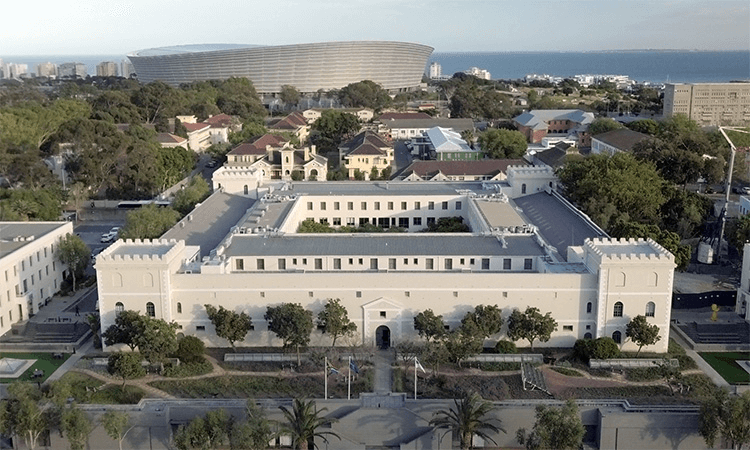International opportunities are a key motivator for many people pursuing business education worldwide. Business schools, with their international partnerships, connections with multinationals, and culturally diverse ecosystems, provide a launchpad for careers that span the globe.
However, achieving this often comes at a significant cost. The average cost of tuition for the world's top-ranked MBA programs ranges from $90,000 to more than $180,000, according to estimates in our 2025 Cost of MBA Report.
Seeking out low-cost, high-value study options can make all the difference if you’re searching for new opportunities.
A high-value international study opportunity
As a developing powerhouse in the business education field, boasting business schools such as the University of Cape Town (UCT) GSB, which offer study options at relatively affordable prices, South Africa is an attractive option for those seeking to develop high-flying international business careers without breaking the bank.
Studying the UCT GSB MBA, for example, costs international students R687 000 ($39,800), while African citizens and residents pay considerably less, at R344 860 ($20,000).
Offered by an institution that's earned the gold standard of triple crown accreditation from EQUIS, AACSB, and AMBA, this is significant when compared with the cost of programs in other regions. In Europe, even the most affordable MBA programs can cost around $50,000 to attend, while MBA tuition fees often exceed six figures at business schools in the US.
The story is similar for those who are earlier in their careers and interested in studying a Master's in Management (MiM). The CEMS MiM—a program UCT offers in association with CEMS, an alliance of some of the world's leading business schools and companies—costs R411 330 ($23,800) for international students. Again, African citizens and residents pay considerably lower fees at R266 580 ($15,400).
Compared with other locations like the UK, where international MiM students often have to pay more than £35,000 ($47,000), the cost of the program is favorable. Yet, those looking to gain a competitive edge in the job market can still be sure they are availing themselves of a high quality degree, with the CEMS MiM ranking among the world's top master's degrees in management, according to QS.
Beyond their initial costs, students can make the most of Cape Town's energetic student life while also benefiting from a relatively inexpensive cost of living—Cape Town is estimated to be more than 50% less expensive to live than London—ensuring they continue to see value for money after arriving on campus.
However, the benefits of choosing a high-value study option go beyond just finances.

©michaeljung via iStock
Beyond the money: The value of international study
Experience an immersive environment and unlock new opportunities
Enrolling in a business degree abroad is a significant decision, but it can yield huge rewards by helping you maximize the value of your studies.
Immersing yourself in a new environment, where cultural norms and business practices differ, can aid your professional development. This experience can help you learn how to navigate uncertainty, become agile when faced with new situations, and grow more resilient as you become accustomed to life in a new location.
You can also find opportunities for personal growth. Experiencing local culture, participating in social activities, and even eating different food for the first time can help you leave comfort behind and further prepare you to undertake new challenges after you graduate.
Studying in Cape Town, international students can take in the city's world-renowned scenery while also embedding themselves in a hub of commerce and innovation. At the southern tip of Africa, Cape Town serves as a gateway to the continent and other regions across the globe, meaning career development opportunities for business school students are varied.
Studies show that employers value the heightened cultural awareness applicants with international experience possess, as well as their improved soft skills. Paired with the fundamental knowledge that a business degree such as an MBA or MiM teaches, this can make for a potent combination when it comes to applying for jobs.
This impact on your post-graduation prospects is key to the value you can gain from international study.
Having spent time abroad, you will be well positioned to show international employers that you can replicate this success in another location. This preparation can give you greater confidence to seek out opportunities further afield than you may have considered before studying. Among CEMS MiM graduates, 92% have worked outside of their home countries since leaving the program, while 75% work for multinational organizations.

Broaden your cultural horizons with diverse new connections
While experiencing life in a new country plays a significant part in expanding your cultural awareness, studying in a diverse location such as Cape Town will allow you to further develop this within a highly international learning ecosystem.
Inside the UCT GSB classroom, where master's and MBA cohorts hail from across the globe, students are encouraged to work alongside their classmates during business simulations, consulting projects, and other team-based initiatives.
By learning to navigate differences in geographical and professional backgrounds, student gain a more enriching study experience while refining their cultural skills and building new connections.
Building your network is central to any postgraduate business degree, and when studying abroad this value is amplified. Alongside core curricular activities, you gain opportunities to attend guest lectures, speak with alumni working across industries, and even interact with multinational firms. This can help you further your understanding of different industries, career paths, and working practices.
By interacting with a broad array of professionals during your time studying abroad, you can gain the awareness to be able to operate across cultural boundaries throughout your career. This ensures you gain an additional edge over those without international exposure.
Become a responsible leader fit for the modern workplace
According to a 2024 global study, more than half of employees feel their employers’ stance and actions on social and political issues are important, while a further 38% seek alignment in these areas when choosing who to work for. Responsible, values-driven leadership is growing increasingly important in the workplaces of today.
If your ambition is to launch an international management career and become a leader in the workplace, understanding the core principles of values-driven leadership—such as self-reflection, balance, and continuous growth—is essential to success.
Pursuing a degree at a business school that embodies these values can help you integrate responsible leadership into your management approach and prepare you to meet the demands of today’s international workplace.
At UCT, much of the school’s research and expertise is rooted in areas such as social innovation, diversity and inequality, and environmental sustainability.
This research is incorporated within the learning experience. MBA students, for example, undertake a range of modules rooted in responsible leadership, including Purposeful People Management, Social Innovation and Entrepreneurship, and Organizational Leadership and Values. During a citizenship-focused module, students are required to spend 50 hours undertaking practical work with NGOs. Similarly, CEMS MiM students at UCT gain opportunities to cover topics such as navigating change in diverse environments and how to effectively lead across global contexts.
Through developing knowledge of ethical strategies, discovering how to make impactful decisions, and learning how to become change-makers who contribute to a more sustainable and inclusive world, this approach prepares students for success in a workplace where principles of responsible leadership are increasingly valued.
Paired with the immersive and international environment that comes with learning in Cape Town, this means UCT GSB students gain a high-value learning experience that provides a framework for long-term success.




